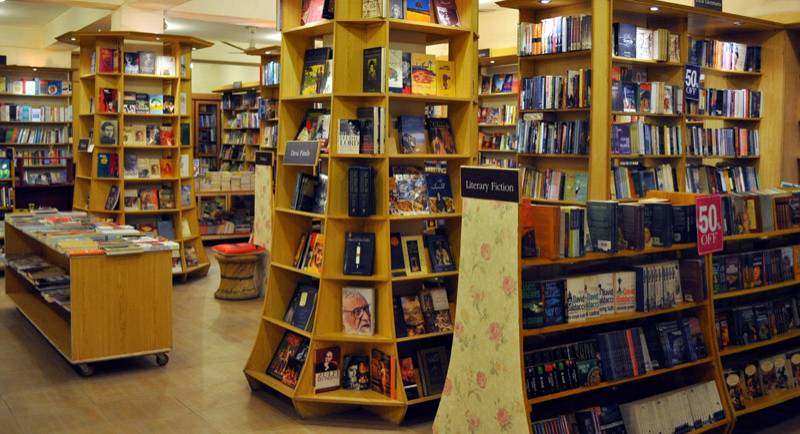
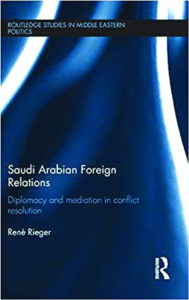
Saudi Arabian Foreign Relations: Diplomacy and Mediation in Conflict Resolution
René Rieger
Routledge (2016)
In recent decades, Saudi Arabia has committed itself to playing the part of mediator in intra-national and international conflicts in the greater Middle East region. Examples include the two Saudi-introduced Arab Peace Initiatives of 1982 and 2002, mediation attempts between Algeria and Morocco in the West Sahara conflict, Iraq and Syria during the Iran-Iraq War and Iran and Iraq towards the end of their military conflict.
Saudi Arabian Foreign Relations provides a new insight to current studies on Saudi foreign policy and mediation in international relations. The book offers a detailed analysis of Saudi Arabia’s intermediary role in the intra-state conflicts in Yemen, Lebanon and the Palestinian territories, and the successes and limitations of each. Additionally, it provides an updated examination of Saudi Arabia’s role towards resolution of the larger Arab-Israeli conflict.
Saudi Arabian Foreign Relations contributes to a far deeper understanding of Saudi foreign policy, and therefore will be of great interest to students and scholars of Middle East Politics and International Relations.
Rene Rieger is Chairman of Middle East and International Affairs Group (MEIA Research).
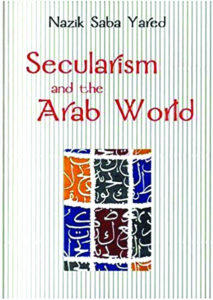
Secularism and the Arab World
Nazik Saba Yared
Saqi Books (2002)
This book attempts to demonstrate that secular Arabic thought is not a novelty. Although much of what is being written in the Arab world today is of a religious and traditional nature, the beginnings of secularism can be traced back to the writings of various thinkers, mainly from Egypt, Lebanon, and Syria.This study spans the period from the mid-19th century – when the first Arab intellectuals came into contact with Western thought and civilization – to the mid-20th century when secularism became part of the political, social and educational systems in many Arab countries.
Nazik Saba Yared is a Lebanese academic and writer who teaches at Beirut University College. She is the author of several works on classical Arabic literature and four novels (all in Arabic). Impact of the West, which was published in Arabic to critical acclaim, is the first of Yared’s books to be translated into English.
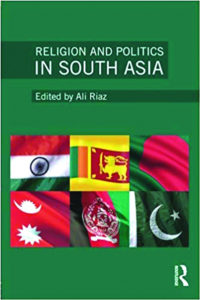
Religion and Politics in South Asia 1st Edition
Ali Riaz
Routledge (2010)
Religion and religio-political forces have become potent influences in the domestic politics of many countries irrespective of geographical location, stages of economic growth, and systems of governance. The growing importance of religion as a marker of identity and a tool of political mobilization is reshaping the political landscape in an unprecedented manner, and South Asia, which contains the world’s largest populations of Muslims and Hindus with significant number of Buddhists, is no exception to this fact.
This book presents a comprehensive analysis of the interaction of religion and politics in Afghanistan, Bangladesh, India, Nepal, Pakistan and Sri Lanka. Although the specific circumstances of each country are different, in recent decades, religion, religio-political parties, and religious rhetoric have become dominant features of the political scenes in all six countries. The contributors offer a thorough examination of these developments by presenting each country’s political system and the socio-economic environment within which the interactions are taking place. The analysis of the various factors influencing the process of the interactions between religion and politics, and their impact on the lives of the people of the region and global politics constitute the core of the chapters.
Ali Riaz is Professor and Chair of the Department of Politics and Government at Illinois State University, USA. Previously he has taught at universities in Bangladesh and England, and worked as a broadcast journalist at the British Broadcasting Corporation (BBC) in London. His recent publications include Faithful Education: Madrassahs in South Asia (2008); Islamist Militancy in Bangladesh, A Complex Web (2008).
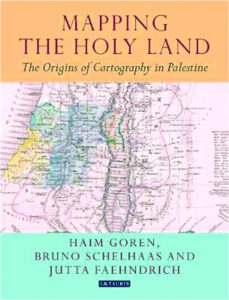
Mapping the Holy Land: The Foundation of a Scientific Cartography of Palestine
Bruno Schelhaas, Jutta Faehndrich and Haim Goren
I.B. Tauris (2017)
Through a detailed study of the work of three of the leading figures of the era - Augustus Petermann, Physical Geographer Royal to Queen Victoria; cartographer Charles Meredith van de Velde, who produced the finest map of the region at the time; and Edward Robinson, founder of modern Palestinology - the authors explore the complex cultural, cartographic and technical processes that shaped and determined the resulting maps of the region. Making full use of newly discovered archival material, and richly illustrated in both colour and black and white, Mapping the Holy Land is essential reading for cartographers, historical geographers, historians of mapmaking, and for all those with an interest in the Holy Land and the history of Palestine.
Haim Goren is Professor of Historical Geography, Tel Hai College, Israel. He has a longstanding interest in the Holy Land, European activity in Ottoman Palestine and the Near East, and the history of the modern scientific study of these regions. He is the author of Dead Sea Level: Science, Exploration and Imperial Interests in the Near East (2011) and (with E.Dolev and Y. Sheffy) Palestine and the First World War: New Perspectives (2014), both published by I.B.Tauris.Bruno Schelhaas is Head of the Archive for Geography, Leibniz Institute for Regional Geography,Leibniz, Germany. His interests include the history of geography and cartography, historical geography and archival science.Jutta Faehndrich is a researcher with the Leibniz Institute for Regional Geography, where her research focus is on the history of cartography, European cultural history, and cultures of memory.
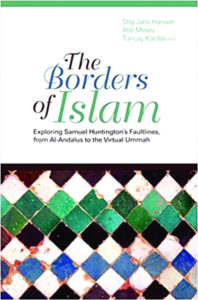
Borders of Islam: Exploring Samuel Huntington’s Faultlines, from Al-Andalus to Virtual Ummah
Stig Jarle Hansen, Atle Mesoy and Tuncay Kardas
Oxford University Press (2009)
In his seminal work The Clash of Civilizations, Harvard professor Samuel P. Huntington claimed that conflict between cultural blocs, or civilizations, will dominate the future. More controversially, he predicted that future conflicts will occur on the borders between Western and Islamic civilisations. The statements of Osama Bin-Laden seem to support his views: ‘This battle is not between al-Qaeda and the US’, he said in October 2001. ‘This is a battle of Muslims against the Global Crusaders’. This specially commissioned set of essays sets out critically to examine the border zones of Islamic civilisation, be they geographical, cultural or virtual. The contributors explore the local dynamics in these zones to test whether or not they support or contradict Huntingdon’s thesis of an emerging global confrontation between Islamic civilisation and its neighbours, be they Christian, Hindu, Buddhist or godless. Among the borders discussed are those where Muslims are the majority (Afghanistan, Bosnia, Chechnya, Ethiopia, Indonesia, Somalia, Pakistan, Turkey), those with very large Muslim minorities (Philippines, Nigeria, India) and those where new faultlines have been created, either through migration (France, the United Kingdom, the United States, Spain) or technology (the internet). A commonthread running through the book is whether the rise of international Salafi jihadism can be traced to countries on the faultline between Islam and the non-Islamic world. The contributors conclude by arguing that many of the border regions of Islamic civilisation are influenced by mechanisms far more complex than those highlighted in The Clash of Civilizations, suggesting that poverty and institutional failure, both often the result of war, tend to heighten religious awareness and practice, but that the effects of these phenomena differ from those suggested by Huntington.
Stig Jarle Hansen is an Associate Professor in International Relations at the University of Life Science in Norway. He specialises in the geopolitics of the Middle East and the Horn of Africa, as well as the links between religion, politics and war economies.
Atle Mesøy is a researcher in political Islam.
Tuncay Karadas teaches at Sakarya University, where he specialises on Turkish security, political theory and Islam.

